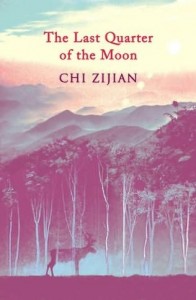A Book Review by Stefanie Field
The Last Quarter of the Moon by Chi Zijian
 I absolutely love this book, but I feel so disgusted with myself now. This story tells the long tale of an Evenki tribe, living in the mountains of Northeastern China. You never learn the narrator’s name, and you will probably never grasp the relations of a big & complicated family. But two things will emerge from this reading experience. This first is how deep you truly long to reconnect with the natural earth and her gifts. The other is the realization that your small actions, no matter how minuscule or how distant, affects the future of everyone and everything.
I absolutely love this book, but I feel so disgusted with myself now. This story tells the long tale of an Evenki tribe, living in the mountains of Northeastern China. You never learn the narrator’s name, and you will probably never grasp the relations of a big & complicated family. But two things will emerge from this reading experience. This first is how deep you truly long to reconnect with the natural earth and her gifts. The other is the realization that your small actions, no matter how minuscule or how distant, affects the future of everyone and everything.
Right after the title page, you will find the narrator’s family tree. From just a glance, you know to prepare for a complex story. But don’t let it intimidate you. You don’t need to memorize it to understand the beauty of the book. Moreover, the writing (or the translation from Chinese) is beautiful. It will naturally pull you in like a river reaching its arms to you. Such artistic literary prose reminds me why I fell in love with historical fiction.
There is essentially no plot, as it reads like a fictional memoir. The 90-year-old narrator is aware that the fire of her light is about to be put out so she tells her tale from when she was a child. It’s like sitting next to the fireplace while your grandparents recount their cherished memories. There are no chapters, and only a few section breaks. It displays the story (and thus, the narrator’s life) as a continual thread. Along with the all-important and divine reindeer, you will grow fond of the many characters as they share their nomadic lifestyle. A few, like Nora, bring comedic relief to this cultural tale. And then there are a couple who will drive you mad, like Yveline. Despite her difficult history, you will still be surprised at how rotten and black her heart can be. The most unfortunate characters will be Nihau & Luni, a wife as Shaman and a husband as Headman. Their life & their children seem to be forever cursed.
The first half of the book is wondrous and awe-inspiring. The second half is a spiral of depression as death after death occurs. While the story focuses on the narrator’s family, they have a narrow and personal perspective on life. They intentionally live in the mountains, away from the modern world as the 1930s bring war and the Japanese Invasion. But no matter how isolated they try to be, the affects of globalization & political affairs do not let them become untouchable. A culture of clans & harmony with nature is disturbed, separated, and starved by modern politics and the nature of territorial borders. It gradually becomes a very sad tale.
But for some reason, I felt both enlightened and burdened after the story. I feel more appreciative of the woods, the mountains, the rivers, the sky, the moon, and even the nasty little wasps in the world. But I also feel like the insides of my body has been replaced with crude, heavy rocks and pebbles, weighing me down in disgust. I am the problem, and not yet the solution. I let the entire forests be cut down, elephants be poached, rivers be polluted. I let new malls be built and never ask where the sunset has gone. This book made such a lasting impression on me that I feel disturbed with myself, knowing Mother Nature deserves so much more than just an apology.
I certainly give it 5 out of 5 stars.
★★★★★
It’s a book I highly suggest buying, though I’m sure the lack of plot may bore many readers.
Stefanie Field is a graduate student pursuing a Master’s Degree in International Relations in Bangkok. She is a lover of books and hopes to promote reading culture in Thailand.

